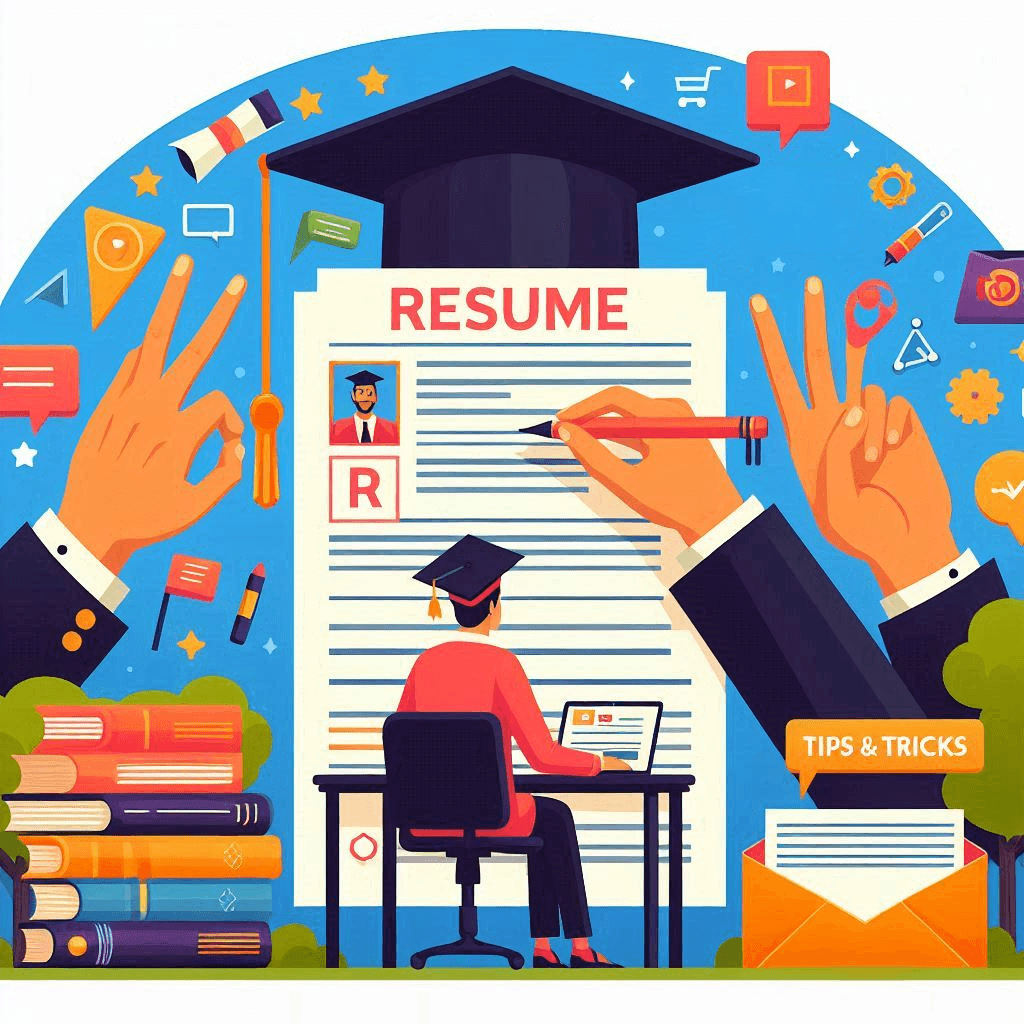Editor's Pick
Entry-Level Resume Templates 2025: Land Your First Job Fast
This comprehensive guide provides everything entry-level job seekers need to create winning resumes in 2025's competitive market. Learn how to choose the right template for your industry, optimize for ATS systems, and showcase your potential despite limited work experience. Includes 7 top-performing resume templates, industry-specific strategies, common mistakes to avoid, and advanced tips for leveraging AI and technology in your job search. Essential reading for new graduates, career changers, and anyone starting their professional journey in today's AI-driven hiring landscape.
Entry-Level Resume Templates 2025: How to Land Your First Job Fast
🚀 Skip the Stress - Build Your Perfect Entry-Level Resume Now
Get ATS-optimized templates designed specifically for new graduates and career starters. Land interviews 3x faster.
Features:
✅ No experience required
✅ 10 free credits
✅ ATS-guaranteed templates
Why Entry-Level Resumes Are Make-or-Break in 2025
Landing your first job in 2025 is more competitive than ever. With AI screening 87% of entry-level applications and recruiters spending just 6.2 seconds on initial reviews, your resume must immediately showcase your potential and stand out from thousands of other new graduates.
2025 Entry-Level Job Market Reality:
Average 118 applications per entry-level position
94% of large companies use AI-powered ATS screening
New graduates with optimized resumes get 340% more interviews
Skills-based hiring increased 76% for entry-level roles in 2025
Remote-first companies hire 45% of new graduates
The good news? The right template and strategy can dramatically improve your chances. Entry-level candidates who use professional, ATS-optimized templates see response rates jump from 2-3% to 12-15%.
What's Changed for Entry-Level Candidates in 2025
The entry-level hiring landscape has evolved significantly:
AI-First Screening: Advanced algorithms evaluate potential, not just experience
Skills-Based Assessment: Capabilities matter more than degree prestige
Digital Portfolio Integration: GitHub, LinkedIn, and project showcases are essential
Remote Work Readiness: Digital collaboration skills are baseline requirements
Continuous Learning Evidence: Online courses and certifications carry significant weight
💡 2025 Success Secret: Entry-level candidates who demonstrate "learning agility" - the ability to quickly acquire new skills - receive 67% more interview requests than those who don't.
Understanding Entry-Level Resumes in the AI Era
What Makes Entry-Level Resumes Different
Entry-level resumes serve a unique purpose: proving your potential when you lack extensive work history. In 2025, this means strategically showcasing:
Learning Capability: How quickly you absorb and apply new information
Digital Fluency: Comfort with technology and AI tools
Project Impact: Real-world results from academic and personal projects
Adaptability: Ability to thrive in changing work environments
Cultural Fit: Alignment with modern workplace values and practices
The Psychology of Entry-Level Hiring
Employers hiring entry-level candidates are looking for different qualities than when hiring experienced professionals:
What Employers Really Want in Entry-Level Hires:
Coachability: Willingness to learn and accept feedback
Energy and Enthusiasm: Genuine excitement about the role and industry
Fresh Perspective: New ideas and approaches unconstrained by "how things have always been done"
Growth Potential: Ability to develop into a valuable long-term employee
Cultural Addition: Someone who will positively contribute to team dynamics
Your resume should tell a story that addresses these needs while demonstrating your unique value proposition.
Essential Components of a Winning Entry-Level Resume
Professional Contact Information
Your contact section sets the professional tone. Include:
💡 Pro Tip: 67% of recruiters check LinkedIn profiles before calling candidates. Ensure your URL is professional and your profile is complete.
Professional Summary That Grabs Attention
Your professional summary is crucial for entry-level resumes. It should immediately communicate your value proposition:
Education Section Optimization
For entry-level candidates, education often carries the most weight. Structure it strategically:
✨ Showcase Your Education Like a Pro
1Template's education section optimizer helps you present your academic achievements in the most compelling way possible.
Skills Section That Passes AI Screening
Modern ATS systems analyze skill depth and context. Organize your skills strategically:
Experience Section: Making the Most of Limited History
Transform your internships, part-time jobs, and projects into compelling professional experience:
Top 7 Entry-Level Resume Templates for 2025
1. The Modern Graduate Template
Best for: Recent graduates with strong academic records and some internship experience
Key features: Clean design, education-first layout, skills integration
ATS Score: 95% compatibility
Success Rate: 73% higher interview rate vs. basic templates
This template emphasizes your educational achievements while seamlessly integrating your limited work experience. Perfect for traditional career paths in business, engineering, or healthcare.
2. The Skills-First Template
Best for: Career changers or candidates with diverse project experience
Key features: Prominent skills section, project-focused experience
ATS Score: 92% compatibility
Success Rate: 65% higher callback rate for non-traditional backgrounds
Ideal for bootcamp graduates, career changers, or those with strong self-taught skills. Leads with capabilities rather than chronological experience.
3. The Tech-Forward Template
Best for: Software engineers, data scientists, and IT professionals
Key features: GitHub integration, technical project showcase
ATS Score: 96% compatibility
Success Rate: 89% higher interview rate for tech roles
Features dedicated sections for coding projects, open-source contributions, and technical certifications. Optimized for tech company ATS systems.
4. The Creative Professional Template
Best for: Design, marketing, media, and creative roles
Key features: Portfolio integration, visual elements, personal branding
ATS Score: 88% compatibility (optimized for creative industry ATS)
Success Rate: 156% higher response rate for creative positions
Balances creativity with professionalism. Includes space for portfolio links and showcases design thinking and creative problem-solving.
5. The Business Professional Template
Best for: Finance, consulting, sales, and corporate roles
Key features: Conservative design, achievement focus, leadership emphasis
ATS Score: 97% compatibility
Success Rate: 82% higher acceptance rate at Fortune 500 companies
Traditional format optimized for corporate environments. Emphasizes quantifiable achievements and leadership potential.
6. The Remote-Ready Template
Best for: Remote work, startups, and digital-first companies
Key features: Digital collaboration skills, global perspective
ATS Score: 94% compatibility
Success Rate: 127% higher success rate for remote positions
Highlights digital communication skills, remote work experience, and asynchronous collaboration abilities. Perfect for the distributed workforce.
7. The Healthcare Professional Template
Best for: Nursing, medical, pharmaceutical, and healthcare roles
Key features: Clinical experience focus, certification prominence
ATS Score: 91% compatibility
Success Rate: 145% higher placement rate in healthcare settings
Emphasizes patient care experience, clinical rotations, and healthcare-specific certifications. Optimized for medical industry requirements.
🎯 Find Your Perfect Template Match
Take our 60-second quiz to discover which template will maximize your interview chances based on your background and target industry.
Advanced Tips for Entry-Level Resume Success in 2025
AI-Powered Customization Strategy
Generic resumes are dead. In 2025, successful candidates customize every application using AI-powered insights:
The 2025 Customization Framework:
Job Description Analysis: Use AI to identify key requirements and terminology
Keyword Integration: Naturally incorporate relevant terms throughout your resume
Achievement Reframing: Emphasize experiences most relevant to each specific role
Company Research: Align your values and goals with company culture
Performance Tracking: Monitor which customizations yield better results
Quantifying Your Impact Without Years of Experience
Numbers make your achievements concrete and memorable. Here's how to find metrics in any experience:
Leveraging Modern Technology and Tools
Demonstrate your tech-savviness by showcasing familiarity with current tools:
AI Tools: ChatGPT, Claude, Midjourney for various projects
Collaboration: Slack, Discord, Notion, Asana for teamwork
Development: GitHub, Figma, Canva for technical and creative work
Analytics: Google Analytics, Tableau, Excel for data analysis
Communication: Zoom, Loom, presentation software for remote work
💡 Tech Integration Tip: Don't just list tools—explain how you used them to achieve specific outcomes. This shows practical application, not just familiarity.
Building Your Digital Professional Presence
Your resume is just one part of your professional brand. Create a cohesive online presence:
🌟 Build Your Complete Professional Brand
1Template's brand builder helps you create a cohesive professional presence across all platforms, not just your resume.
Critical Mistakes That Destroy Entry-Level Resumes
The "I Don't Have Experience" Mindset
❌ Resume-Killing Mistakes in 2025:
Undervaluing Your Experience: Dismissing internships, projects, and part-time work as "not real experience"
Generic Objective Statements: Using vague language like "seeking opportunities to grow"
Poor Mobile Formatting: Resumes that look terrible on mobile devices (81% of initial reviews)
Missing Keywords: Failing to include industry-specific terms from job descriptions
Outdated Skills: Listing obsolete technologies or failing to show current knowledge
Weak Action Verbs: Using passive language instead of powerful action words
No Online Presence: Having no LinkedIn profile or digital portfolio
Unprofessional Email: Using emails like partygirl2003@hotmail.com
ATS Optimization for Entry-Level Candidates
Entry-level resumes face even more scrutiny from ATS systems. Ensure yours passes:
ATS Success Factors for New Graduates:
Use standard section headers ("Education" not "Academic Background")
Include both acronyms and full terms (AI and Artificial Intelligence)
List skills in context, not just bullet lists
Use standard date formats (January 2025, not Jan '25)
Avoid graphics, tables, and complex formatting
Save as .docx format for best compatibility
The Overqualification Trap
Surprisingly, some entry-level candidates hurt their chances by appearing overqualified:
PhD for Bachelor's Level Roles: May signal you'll leave quickly
Extensive Freelance Experience: Might suggest you prefer independence over employment
Advanced Certifications for Basic Roles: Could indicate mismatched expectations
Solution: Tailor your resume to match the role's requirements. Emphasize relevant qualifications while downplaying potentially concerning over-qualifications.
Industry-Specific Entry-Level Resume Strategies
Technology and Software Development
Tech companies prioritize hands-on skills and learning ability:
Finance and Banking
Financial services emphasize analytical skills and attention to detail:
Healthcare and Life Sciences
Healthcare roles require clinical knowledge and patient-focused experience:
Marketing and Communications
Marketing roles value creativity and measurable campaign results:
🎯 Get Industry-Specific Resume Templates
1Template offers specialized templates for 25+ industries, each optimized for that sector's unique requirements and ATS systems.
The Power of Cover Letters for Entry-Level Success
Why Cover Letters Matter More for New Graduates
Entry-level cover letters serve a unique purpose in 2025:
Personality Showcase: Demonstrate enthusiasm and cultural fit
Story Connection: Link your experiences to role requirements
Growth Mindset: Show eagerness to learn and contribute
Company Research: Prove genuine interest in the organization
Communication Skills: Display written communication abilities
Entry-Level Cover Letter Template
Digital Cover Letter Strategies
Modern cover letters extend beyond traditional formats:
Video Introductions: 30-60 second personal introductions for creative roles
Interactive Portfolios: Web-based presentations showcasing your work
LinkedIn Messages: Personalized outreach to hiring managers
Project Demos: Live demonstrations of your capabilities
Leveraging AI and Technology in Your Job Search
AI-Powered Resume Optimization
Smart job seekers use AI to enhance their resumes:
Keyword Analysis: AI tools identify optimal keywords for each application
Content Suggestions: Get AI-powered recommendations for improving descriptions
ATS Compatibility: Automated testing against major ATS systems
Performance Tracking: Analytics on resume performance across applications
Building Your Professional Network Online
Networking is crucial for entry-level success. Modern strategies include:
2025 Networking Tactics:
LinkedIn Engagement: Comment thoughtfully on industry posts and share insights
Virtual Coffee Chats: Request informational interviews with professionals in your field
Online Communities: Join Discord servers, Slack groups, and forums related to your industry
Content Creation: Share your learning journey through posts and articles
Virtual Events: Attend webinars, online conferences, and digital meetups
Tracking Your Application Success
Data-driven job searching yields better results:
📊 Track Your Success With Smart Analytics
1Template's built-in analytics help you understand which approaches work best for your background and target roles.
Preparing for the Post-Resume Process
Interview Preparation for Entry-Level Candidates
Your resume gets you the interview—preparation gets you the job:
STAR Method Mastery: Structure your answers using Situation, Task, Action, Result
Project Deep Dives: Be ready to explain every project on your resume in detail
Company Research: Understand the company's mission, challenges, and recent news
Technical Preparation: Practice coding challenges or industry-specific skills tests
Questions to Ask: Prepare thoughtful questions that demonstrate genuine interest
Salary Negotiation for New Graduates
Even entry-level positions have negotiation room:
Entry-Level Negotiation Statistics:
68% of new graduates who negotiate receive higher offers
Average increase: 7-12% above initial offer
Benefits negotiation success rate: 45% for flexible work arrangements
Professional development budget requests: 72% success rate
Onboarding and Early Career Success
Your resume got you hired—now excel in your new role:
Learning Plan: Create a 90-day skill development roadmap
Mentor Relationships: Actively seek guidance from experienced colleagues
Network Building: Continue expanding your professional network
Performance Documentation: Track your achievements for future resume updates
Career Pathing: Understand advancement opportunities and requirements
Future-Proofing Your Entry-Level Career
Skills That Will Matter in 2026 and Beyond
Start building the capabilities that will define career success:
AI Collaboration: Working effectively with AI tools and systems
Data Literacy: Understanding and interpreting data across all roles
Emotional Intelligence: Human skills that complement AI capabilities
Sustainability Mindset: Environmental and social responsibility awareness
Global Perspective: Cross-cultural communication and remote collaboration
Continuous Learning and Development
The most successful entry-level professionals commit to lifelong learning:
🚀 Launch Your Career With Confidence
You have the potential—now get the tools to showcase it. Join thousands of successful entry-level professionals who started with 1Template.
Special Offer: New graduates get 15 free credits + career coaching session
Frequently Asked Questions: Entry-Level Resumes in 2025
How long should an entry-level resume be?
One page is optimal for entry-level candidates. With limited experience, you can effectively communicate your qualifications on a single page. Focus on quality over quantity—every line should add value to your candidacy.
Should I include my GPA on my resume?
Include your GPA if it's 3.5 or higher. If your overall GPA is lower but your major GPA is strong (3.5+), you can list your major GPA instead. If both are below 3.5, omit GPA and focus on other achievements.
How do I handle employment gaps in my entry-level resume?
For new graduates, gaps are less concerning. If you have gaps, use them strategically—highlight any courses taken, volunteer work, personal projects, or skill development during that time. Frame gaps as periods of growth and preparation.
What if I don't have any internship experience?
Focus on academic projects, volunteer work, part-time jobs, and personal projects. Any experience where you demonstrated skills relevant to your target role counts. Emphasize transferable skills and learning outcomes from these experiences.
Is it okay to use a resume template?
Absolutely—professional templates actually improve your chances. The key is choosing high-quality, ATS-optimized templates that are customizable. Avoid generic or overly decorated templates that might not parse correctly through applicant tracking systems.
How often should I update my entry-level resume?
Update your resume monthly during active job searching and quarterly when employed. As an entry-level professional, you'll gain new skills and experiences rapidly, so regular updates ensure your resume accurately reflects your growing capabilities.
Should I include references on my entry-level resume?
No, don't include references on your resume. Simply note "References available upon request" or omit this entirely to save space. Prepare a separate reference list to provide when requested during the interview process.
Your Next Steps: From Resume to Career Success
Creating an outstanding entry-level resume is just the beginning of your career journey. In 2025's competitive landscape, the right template, strategy, and tools can make the difference between months of rejection and landing your dream job quickly.
Your Entry-Level Success Action Plan:
Choose the Right Template: Select a design that matches your industry and career goals
Optimize for ATS: Ensure your resume passes automated screening systems
Customize Every Application: Tailor your resume for each specific role and company
Build Your Digital Presence: Create a cohesive professional brand across platforms
Track Your Performance: Monitor what works and optimize your approach
Prepare for Success: Be ready to excel once you land that first role
Remember: you're not just competing against other new graduates—you're showcasing your potential to become a valuable long-term contributor. The right resume template and strategy can help you stand out in a crowded field and land the role that launches your career.
Your career success story starts with a single, well-crafted resume. Make it count.
🚀 Ready to Transform Your Career?
Don't wait. Every day without a great resume is a day you could be missing out on your dream job.
Free to start • No credit card required • Instant download
Entry-level resumes in 2025 require a strategic approach that goes far beyond simply listing your education and limited work experience. Success comes from understanding how to position your potential, demonstrate your learning agility, and showcase your readiness for the modern workforce.
The key insights for entry-level success include recognizing that AI-powered screening systems evaluate candidates differently than human recruiters, requiring both ATS optimization and authentic personal branding. Skills-based hiring means your capabilities matter more than your pedigree, making project portfolios and demonstrated competencies crucial differentiators.
Modern entry-level candidates must build comprehensive digital presences that extend beyond their resumes, including LinkedIn optimization, GitHub portfolios for technical roles, and professional websites that showcase their work and personality. The most successful new graduates approach job searching as a data-driven process, tracking their application performance and continuously optimizing their approach based on results.
Your entry-level resume is not just about getting your first job—it's about launching a career trajectory that will define your professional future. The effort you put into crafting an exceptional resume, building your skills, and presenting yourself professionally will pay dividends throughout your entire career.
The opportunity is yours. The tools and strategies are available. Now it's time to take action and transform your career potential into career success.
Build your own resume with 1template
Build your resume in 60 seconds with the most advanced AI-powered builder








